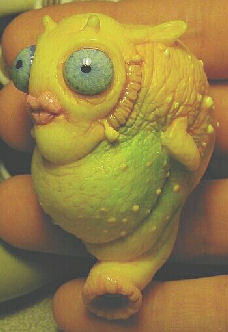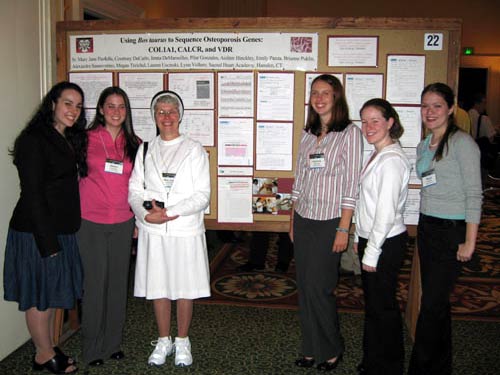Better All The Time #24

| ||
|
It's that time again. Take a break from all the gloom and doom and enjoy a walk, however brief, on the positive side. We've assembled ten news items guarantee to make you feel better about the world and where it's headed.
So let's get started.
|
The information age has been driven and dominated by “technopreneurs”--a small army of "geeks" who have reshaped our world faster than any Alexander, Napoleon or Genghis Khan could.
And that was the easy part. We now have to apply communications technologies to save lives, improve livelihoods and eventually lift millions of people out of squalor, misery and suffering.
Item 1
Prolog to the Future

Almost four decades ago, Stanley Kubrick gathered the world's scientific minds and asked them to predict the future. Their thoughts would then form the opening sequence of 2001: A Space Odyssey, his epic about a mission to Jupiter which becomes a life or death battle between the space crew and their on-board computer HAL 9000.
But the interviews were never screened and the collective thoughts of 21 eminent men and women of science appeared to have been lost for ever.
Now the musings are to be made public for the first time when they are published next month, giving Kubrick enthusiasts an insight into his ultimate vision for the classic film.
The good news:
It's a conversation across time. To hear what Isaac Asimov, Margaret Mead,
Freeman Dyson, Sir Bernard Lovell, and many others had to say about the future
-- about the era we are living in, and beyond -- some 35-40 years ago, is a
wonderful gift. What did they get right? What did they miss? And what are we
not thinking about now that they were
then, and why?
We'll know very soon.
Top
Item 2
The
Latest Buzz
Roland Piquepaille describes some recent, amazing contributions being made by bees.
Two months ago, I told you that bees could be trained to find land mines. Now, researchers from University College London (UCL) have shown that bees are able to solve complicated color puzzles. In their study, bees were trained to find artificial flowers containing a nectar reward and colored in blue. Then they removed the nectar and put at random artificial flowers illuminated by yellow, blue, yellow and green lights. But wherever the blue flowers were, the bees continued to select them even if there was no longer a reward. These findings may soon lead to the design of sophisticated visual systems for autonomous robots.
The good news:
No longer satisfied with mere honey-making and flower-pollinating, it appears that bees are moving into some high-concept endeavors. They can be trained to sniff out the explosives in land mines in a matter of days, and are highly reliable at locating the hidden killers. Using bees is a huge improvement over the standard method, in which trained mine-hunters, often accompanied by dogs, subject themselves to tremendous risk by looking for mines on foot. Bees are perfect for this: they can find the mines, but they can't trip them.
Meanwhile, their clever color-pattern-detection skills are paving the way for a coming generation of highly sophisticated puzzle-solving robots--which might also help us find land mines, along with performing dozens, if not hundreds of other useful tasks.

Item 3
The
First Hydrogen Fuel Cell Car
Jon Spallino and his family have become the first people to test a hydrogen fuel cell car in real world conditions. They are being leased the car by Honda as part of an early test to determine whether the technology can work outside the lab.
Honda actually built a hydrogen station for the family to use, but the fire department, concerned about a Hindenburg-esque explosion, wouldn't allow it to open. So, the family is currently fueling the car at Honda's U.S. headquarters.

The good news:
We're eager to see whether hydrogen fuel cell vehicles are the next big thing.
What better way to test than with a real family fighting rush hour traffic and
picking up the kids from school?
Also:
There was other big hydrogen
news last week. Israeli scientists announced that they have developed
a system for extracting hydrogen from water as needed for use in an internal
combustion engine - no fuel cells or electricity involved.
Scientists seem determined, one way or another, to put hydrogen to work for
us.
Item 4
A Shot of DNA
Several biotechnology companies are at work on a new and quicker way of making a flu vaccine they hope can replace one that requires people to be inoculated with the entire influenza virus. Their technique: extract just a few genes from the virus and inject it into people.
The nascent technology, called DNA vaccines, is a form of gene therapy that proponents argue is the best way to overhaul a 50-year-old vaccine manufacturing system.
The good news:
Now, with a flu coming that's so deadly that it kills the chicken eggs before a vaccine is made, we humans show our adaptability by developing a whole new way to vaccinate. This method should eventually allow us to create vaccines "on the fly" - vaccines in days or even hours after a new strain is discovered. H5N1 pushed, and we pushed back. Intelligence triumphs!
Also:
We are hopeful that this new method may prove helpful in battling humanity's
other great viral enemies: TB, Malaria, and AIDS.
Item 5
Nun
More Deserving
Speaking of DNA, here's an unexpected development:
There were many big-league DNA scientists at the annual genome sequencing conference held here last month, but no one stood out more than a slight high school teacher in religious habit towing five of her students through the imposing crowd of genetics pioneers with a quiet grace.
The unlikely delegate was Sister Mary Jane Paolella, of Sacred Heart Academy, an all-girls Roman Catholic high school in Hamden, Connecticut. She wasn't here on a sightseeing trip. Paolella showed up with her students to make an official presentation of DNA sequencing data that her honors biotechnology class generated from genes associated with osteoporosis.
The good news:
The students sequenced three bovine genes that correspond to human genes associated with osteoporosis. Their work was so good that it will be included in GenBank, collection of all DNA sequences maintained by the National Institutes of Health. Several of the girls now say that they are looking to make their careers in science or engineering.
Bonus:
The work the students did was part of an overall project that the Sacred Heart
Academy has undertaken to tackle osteoporosis. These students are on the front
lines of the healthy
life extension movement.
Item 6
A
Better Understanding of Klotho
Scientists say the recently discovered anti-aging hormone 'Klotho' acts by increasing a cell's ability to detoxify harmful reactive oxygen species...
Makoto Kuro-o, assistant professor of pathology at the University of Texas Southwestern Medical Center, has discovered one way in which Klotho extends lifespan. Using cultured cells and transgenic mice, the researcher showed Klotho increases resistance to oxidative stress.
The good news:
We began to get excited about Klotho last August when Reason at FightAging
reported:
It is pleasing to see that Klotho has now been welcomed into that small, select circle of known ways to significantly extend healthy life span in mice
Scientists knew that Klotho could extend life in August but only could guess how it worked. By November they are already beginning to learn why. This speed is cause for optimism.

Top
Item 7
MPAA
Jumps the Shark
This may not immediately seem like a good news story, but stick with us. Here
are the facts:
A 67-year-old man who says he doesn't even like watching movies has been sued by the film industry for copyright infringement after a grandson of his downloaded four movies on their home computer.
The Motion Picture Association of America filed a federal lawsuit Tuesday against Fred Lawrence of Racine, seeking as much as $600,000 in damages for downloading four movies over the Internet file-sharing service iMesh.
The good news:
Admittedly this doesn't seem
like good news, when you consider the fact that the grandson apparently didn't
realize he was committing a criminal act, and that the grandfather had no idea
that such activity was even taking place. Or when you learn that the grandfather
had the chance to settle for a much smaller amount, but...
"I can see where they wouldn't want this to happen, but when you get up around $4,000 … I don't have that kind of money," Lawrence said. "I never was and never will be a wealthy person."
No, it really doesn't seem like good news at all. But, still...
there's just something so familialabout
this story.
It's kind of like this story, isn't it?
Or is it more like this
one ?
Or, wait -- it's this
one isn't it?
To paraphrase Zuzu: "Teacher says that every time the MPAA acts
like a bunch of heartless thugs, an angel gets its wings."
Anyhow, we know how this one ends. If the MPAA would only pay a little more attention to some of their classic storylines, they would realize that things are bound to go better for Jimmy Stewart than they are for Lionel Barrymore.

 Item 8
Item 8
So? We Like Mice!
Some readers have commented that there is almost always a picture of a mouse in Better All The Time contents collage and, correspondingly, almost always a good news piece that involves a mouse. We won't even attempt to deny it. What with mice developing the ability to regenerate their little bodies and with generous donors putting up more and more money to help ensure that they live longer, the mouse world is improving exponentially.
Plus, look at the little guy. Isn't he cute?
More thoughts on the significance and the Methuselah Mouse Prize (and other prizes) can be found here.
Star Trek Watch: Can the Transporter Be far Behind?

Technology that provides live translation of speech from one language to another has been revealed by scientists from the US and Europe.
This and other translation technologies were demonstrated publicly for the first time at Carnegie Mellon University in Pittsburgh, US, last Thursday. They were developed by researchers from the International Center for Advanced Communication Technologies (InterACT), a collaboration between Carnegie Mellon and the University of Karlsruhe in Germany.
The good news:
Here at Better All The Time, we are committed to keeping you, the reading
public up to speed on all developments that bring our world closer to that of
Star Trek. (Granted, what we're showing here is a babel fish from Hitchhiker's
Guide to the Galaxy, but it's a more interesting picture.) Last time, it
was transparent
aluminum . Now we have the universal
translator . Transporters and warp engines may still be a ways off, but
then again, a few years ago we might have thought the same thing about communicators
.
Or even replicators.
While reading about Microsoft's announcement to publish "live" Internet software, we learned about one company that's already made the leap. "Writely" is an free online word processor that allows easy collaboration on documents. When we collaborated on writing projects in the past, we had to constantly guard against "over-writing" each other. Instant messages and schedules for writing were the rule of the day. When using Writely to compose this edition of BATT we found that Writely warns when the other writer logs on to edit. It also keeps a revision history.
Otherwise Writely is a simple but decent word processor. Most basic functions are available including spell check. You can save offline as a Word documents, but we suspect that most of our documents will be saved online. You can email collaborators directly from the document, but we hope for a built-in instant messenger in a future edition.
Did we mention it's free?

Better All The Time is compiled by Phil Bowermaster and Stephen Gordon. For more news on how our world is rapidly changing and improving, check out the latest FastForward Radio and the Carnival of Tomorrow.
Live to see it!
